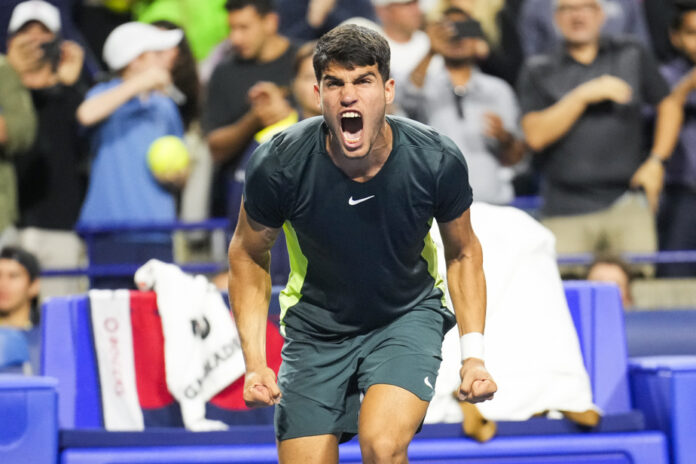(Toronto) It took nerves of steel, and nothing planned for the night, to hold on from start to finish in Thursday night’s game between Carlos Alcaraz and Hubert Hurkacz.
The number of times this third-round encounter could have rocked is almost incalculable. This is often the kind of duel we are entitled to between two top 20 players.
The difference between athletes of this caliber is minimal. Impossible to see with the naked eye. Precisely, it is in these details perceptible only under a microscope that are the reasons why Alcaraz emerged victorious from this duel of 2:38 in three sets of 3-6, 7-6 (2) and 7-6 (3) . He will find Tommy Paul in the quarter-finals.
It is as if this confrontation, like a good book, could and should be told in chapters.
In the first, Alcaraz dropped his first serve sequence to trail 3-0 from the start.
In the second, Alcaraz again lost serve on their first game in the second set, before in turn breaking Hurkacz the next game.
In the third, at the first tiebreaker, Alcaraz was blameless to steal the second set.
In the fourth, a comfortable 5-2 lead for the Spaniard was destroyed by a slack on serve and forehand distress from the point guard.
In the last, a tiebreaker during which the barely 21-year-old player used all his experience to snatch victory.
On the cover page, the winner, crouching, fists clenched, shouting with joy and relief in the direction of his team.
In all matches involving the newest Wimbledon champion, his opponents are well aware that the young prodigy can change the look of a match with a single stroke of the racket.
Unfortunately for poor Hurkacz, this trend was no exception in this disputed game in a relatively chilly climate.
The latter was in the other half of the field, but he still managed to reach the ball, with the end of the racket. And with a single flick of the wrist, he sent his ball across the net, crosswise, under the helpless gaze of Hurkacz.
“That’s the shot of a champion,” yelled a volunteer usher behind us. A high-pitched usher whose love and devotion to the Spaniard was unequivocal, as much as Popa’s to his emptying. However, she was right.
The point was completed and Alcaraz had the break. He had just done what he knows how to do best. He turned to his clan. The crowd roared. And it was the beginning of the end for Hurkacz.
Rare, very rare are the matches where a player has the luxury of breaking the world’s number one racket four times. Including twice at the start and twice at the end of the round. Four key moments, which Hurkacz was unable to take advantage of.
Alcaraz was imperial on serve in the third set, when it mattered most. In his first three service streaks, he gave his rival no points. Thus, Hurkacz should have taken advantage of his four breaks, but in vain. It is as if he had climbed a rugged mountain for almost three hours, and that just before arriving, he had stepped on a rock that caused him to tumble.
He leaves Toronto as his faller progresses in the table.
Hurkacz, with his shyness and discretion, was unable to surf the atmosphere that reigned at Sobeys Stadium. Even though the “Vamos Carlos” played like Paul Piché scores on National Day, a few fewer, but felt, “Come on Huby” sprung up.
Central was ablaze with yellow and red Spanish flags and Alcaraz was asking for more. His followers too. Thanks to their unwavering support since the beginning of the week, he managed to invite them to another great mass on Friday.
The atmosphere was delirious and the evening was well launched on the central, Thursday. Just after the show offered by Carlos Alcaraz and Hubert Hurkacz, the second part provided by Andy Murray and Jannik Sinner was about to begin. And she promised. Until Andy Murray shows up on the central, but in cotton wool, the mine low. And he grabbed the microphone from the master of ceremonies. He came to announce to the spectators that he was not going to be able to play his match due to abdominal tension. “I had the same kind of problem last year at the Stuttgart tournament, just before Wimbledon, which forced me to miss the Queen’s tournament, but I was able to play at Wimbledon,” said he explained, visibly disappointed. The 36-year-old continued: “It took me about 10-12 days to feel good again. It’s not that bad, but there is a danger that it will get worse if I play. He concluded by saying, “I’m so sorry. Thank you all. “Before leaving the field, he signed all the balls he had on hand to please, at least, the fans present.















